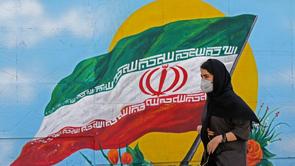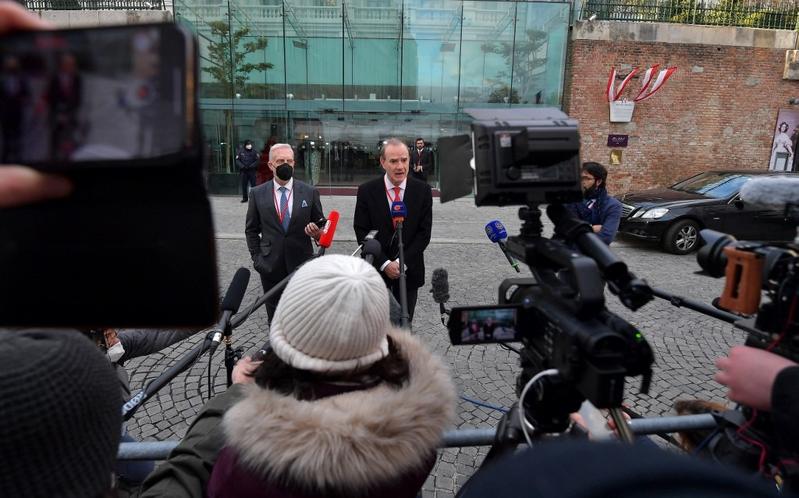 An Iranian woman walks past a mural depicting the Iranian national flag in Tehran, capital of Iran, on March 4, 2020. (ATTA KENARE / AFP)
An Iranian woman walks past a mural depicting the Iranian national flag in Tehran, capital of Iran, on March 4, 2020. (ATTA KENARE / AFP)
Any unilateral US move to introduce unrealistic bill on Iran will have a polarizing effect and bring further disruption to talks aimed at reviving the multilateral 2015 nuclear pact, experts said.
On May 31, a group of US lawmakers reintroduced the Iran China Accountability Act, aimed at prohibiting a nuclear deal until Teheran severs strategic military and security ties with China.
The introduction of the Iran China Accountability Act adds a new dimension to this already complicated issue. The Act has the potential to upset both Iran and China. In the current circumstances, such a decision on the Western power’s end will only contribute to the disruption of the deal and will have a polarizing effect.
Manjari Singh, associate fellow at the Centre for Land Warfare Studies in New Delhi
One of the conditions also requires that any nuclear agreement must be ratified by a two-thirds vote of the US Senate, while the House of Representatives version of the bill was introduced in May last year.
Besides Iran and the US, other parties to the nuclear pact are China, Russia, Britain, France and Germany.
Manjari Singh, an associate fellow at the Centre for Land Warfare Studies in New Delhi, said that by putting economic restraints on the Joe Biden administration, the Act seems to be focused on targeting Iran-China relations. However, the demands put forth by the senators “do not seem to have been thought through”.
“The introduction of the Iran China Accountability Act adds a new dimension to this already complicated issue. The Act has the potential to upset both Iran and China. In the current circumstances, such a decision on the Western power’s end will only contribute to the disruption of the deal and will have a polarizing effect,” Singh told China Daily.
ALSO READ: Iran demands US response to proposals on stalled Vienna talks
She said by putting forth “unrealistic demands”, the Act reflects the lack of consensus with regard to revision of the deal, putting the Biden administration in an uncomfortable position.
Mahjoob Zweiri, a professor on Iran and the Gulf region and a director at the Gulf Studies Centre, at Qatar University in Doha, noted there is context for the Iran China Accountability Act.
“There is a feeling within the US administration that there are complications. There is a discussion about the Iranian assets and how much should be paid back to Iran. And where these should be paid … the governments, the companies that have dealt with Iran, and all these details,” Zweiri told China Daily, adding that the investments may add more complications to the nuclear discussions.
Meanwhile, on June 3, Iran’s Foreign Minister Hossein Amir-Abdollahian called a move by the US, France, Britain and Germany to draft an anti-Iran resolution for the meeting of the International Atomic Energy Agency in Vienna “hasty and unconstructive” and “contrary to the practice of diplomacy”.
ALSO READ: Iran's lawmakers seek US legal guarantee for nuke deal revival
 Deputy Secretary General of the European External Action Service (EEAS) Enrique Mora speaks to journalists in front of the Coburg palace after a meeting of the Joint Comprehensive Plan of Action (JCPOA) in Vienna on Dec 3, 2021. (JOE KLAMAR / AFP)
Deputy Secretary General of the European External Action Service (EEAS) Enrique Mora speaks to journalists in front of the Coburg palace after a meeting of the Joint Comprehensive Plan of Action (JCPOA) in Vienna on Dec 3, 2021. (JOE KLAMAR / AFP)
The 2015 Iran nuclear pact, or the Joint Comprehensive Plan of Action, is the most comprehensive agreement on nuclear nonproliferation ever agreed by world powers with a non-nuclear state. Rather than losing its relevance, the JCPOA is likely to serve as a template in future in the quest of nuclear nonproliferation.
Asif Shuja, Iran expert and senior research fellow at the Middle East Institute at National University of Singapore
The IAEA is currently holding its “Technical Meeting on Synergies between Nuclear Fusion Technology Developments and Advanced Nuclear Fission Technologies” in the Austrian capital from June 6 to 10.
In his speech, IAEA Director General Rafael Grossi said the IAEA remains ready to re-engage without delay with Iran to resolve these matters.
“The 2015 Iran nuclear pact, or the Joint Comprehensive Plan of Action, is the most comprehensive agreement on nuclear nonproliferation ever agreed by world powers with a non-nuclear state. Rather than losing its relevance, the JCPOA is likely to serve as a template in future in the quest of nuclear nonproliferation,” said Asif Shuja, an Iran expert and senior research fellow at the Middle East Institute at National University of Singapore.
Shuja noted that the problems of implementation of this pact are purely “the result of the domestic politics of the United States” and have little to do with the pact’s merit. Domestic issues, he added, often get precedence over international commitments and “the JCPOA has become the victim of this fact”.
Since April 2021, eight rounds of talks have been held in Vienna between Iran and the remaining parties to the JCPOA. Former US president Donald Trump unilaterally withdrew from the deal in 2018 and reimposed sanctions on Teheran.
READ MORE: Iran blames US 'maximum pressure policy' for nuke deal standoff
When talks paused in March, the US had earlier said that a few outstanding issues remain in the nuclear talks, and that the onus was on Iran to make those decisions. Iran, meanwhile, also said there are outstanding issues, including for Washington to remove its designation of Iran’s Islamic Revolutionary Guard Corps as a foreign terrorist organization.
Xinhua contributed to this report.


